11 03 2015
New Updated Version: Free Microsoft 70-467 Dumps From Braindump2go 100% Guarantee Your Success (21-30)
Real Latest 70-467 Exam Questions Updated By Official Microsoft Exam Center! Braindump2go Offers 70-467 Dumps sample questions for free download now! You also can visit our website, download our premium Microsoft 70-467 Exam Real Answers, 100% Exam Pass Guaranteed!
Vendor: Microsoft
Exam Code: 70-467
Exam Name: Designing Business Intelligence Solutions with Microsoft SQL Server 2012 Exam
QUESTION 21
You are designing a partitioning strategy for a large fact table in a data warehouse.
Tens of millions of new records are loaded into the data warehouse weekly, outside of business hours. Most queries are generated by reports and by cube processing.
Data is frequently queried at the day level and occasionally at the month level.
You need to partition the table to maximize the performance of queries.
What should you do? (More than one answer choice may achieve the goal. Select the BEST answer.)
A. Partition the fact table by month, and compress each partition.
B. Partition the fact table by week.
C. Partition the fact table by year.
D. Partition the fact table by day, and compress each partition.
Answer: D
QUESTION 22
You are designing an extract, transform, load (ETL) process for loading data from a SQL Server database into a large fact table in a data warehouse each day with the prior day’s sales data.
The ETL process for the fact table must meet the following requirements:
– Load new data in the shortest possible time.
– Remove data that is more than 36 months old.
– Ensure that data loads correctly.
– Minimize record locking.
– Minimize impact on the transaction log.
You need to design an ETL process that meets the requirements.
What should you do? (More than one answer choice may achieve the goal. Select the BEST answer.)
A. Partition the destination fact table by date.
Insert new data directly into the fact table and delete old data directly from the fact table.
B. Partition the destination fact table by date.
Use partition switching and staging tables both to remove old data and to load new data.
C. Partition the destination fact table by customer.
Use partition switching both to remove old data and to load new data into each partition.
D. Partition the destination fact table by date.
Use partition switching and a staging table to remove old data.
Insert new data directly into the fact table.
Answer: B
QUESTION 23
You have a business intelligence (BI) infrastructure that contains three servers.
The servers are configured as shown in the following table.
You need to recommend a health monitoring solution for the BI infrastructure.
The solution must meet the following requirements:
– Monitor the status of the Usage Data Collection feature.
– Monitor the number of end-users accessing the solution.
– Monitor the amount of cache used when the users query data.
Which health monitoring solution should you recommend using on each server? To answer, drag the appropriate monitoring solutions to the correct servers. Each monitoring solution may be used once, more than once, or not at all. You may need to drag the split bar between panes or scroll to view content.
Answer:
QUESTION 24
Drag and Drop Questions
You are validating whether a SQL Server Integration Services (SSIS) package named Master.dtsx in the SSIS catalog is executing correctly.
You need to display the number of rows in each buffer passed between each data flow component of the package.
Which three actions should you perform in sequence? (To answer, move the appropriate actions from the list of actions to the answer area and arrange them in the correct order.)
Answer:
Explanation:
– You are going to become very very familiar indeed with [catalog].[executions]. It is a view that provides a record of all package executions on the server and, most importantly, it contains [execution_id] the identifier for each execution and the field to which all other objects herein will be related.
QUESTION 25
You are creating a Multidimensional Expressions (MDX) calculation for Projected Revenue in a cube.
For Customer A, Projected Revenue is defined as 150 percent of the Total Sales for the customer. For all other customers, Projected Revenue is defined as 110 percent of the Total Sales for the customer.
You need to calculate the Projected Revenue as efficiently as possible.
Which calculation should you use? (More than one answer choice may achieve the goal. Select the BEST answer.)
A. Option A
B. Option B
C. Option C
D. Option D
Answer: C
QUESTION 26
You are developing the database schema for a SQL Server Analysis Services (SSAS) BI Semantic Model (BISM).
The BISM will be based on the schema displayed in the following graphic.
You have the following requirements:
– Ensure that queries of the data model correctly display average student age by class and average class level by student.
– Minimize development effort.
You need to design the data model.
What should you do? (More than one answer choice may achieve the goal. Select the BEST answer.)
A. Create a multidimensional project and define measures and a reference relationship.
B. Create a tabular project and define calculated columns.
C. Create a multidimensional project and define measures and a many-to-many dimensional
relationship.
D. Create a tabular project and define measures.
Answer: C
QUESTION 27
Drag and Drop Questions
You are designing a self-service business intelligence and reporting environment.
Business analysts will create and publish PowerPivot for Microsoft Excel workbooks and create reports by using SQL Server Reporting Services (SSRS) and Power View.
When the data models become more complex and the data volume increases, the data models will be replaced by IT-hosted server-based models.
You have the following requirements:
– Maintain the self-service nature of the reporting environment.
– Reuse existing reports.
– Add calculated columns to the data models.
You need to create a strategy for implementing this process.
What should you do? To answer, drag the appropriate term or terms to the correct location or locations in the answer area. (Answer choices may be used once, more than once, or not all.)
Answer:
QUESTION 28
You are modifying a star schema data mart that feeds order data from a SQL Azure database into a SQL Server Analysis Services (SSAS) cube.
The data mart contains two large tables that include flags and indicators for some orders.
There are 100 different flag columns, each with 10 different indicator values.
Some flags reuse indicators. The tables both have a granularity that matches the fact table.
You have the following requirements:
– Allow users to slice data by all flags and indicators.
– Modify the date dimension table to include a surrogate key of a numeric data type and add the surrogate key to the fact table.
– Use the most efficient design strategy for cube processing and queries.
You need to modify the schema.
What should you do? (More than one answer choice may achieve the goal. Select the BEST answer.)
A. Define the surrogate key as an INT data type.
Combine the distinct flag/indicator combinations into a single dimension.
B. Define the surrogate key as an INT data type.
Create a single fact dimension in each table for its flags and indicators.
C. Define the surrogate key as a BIGINT data type.
Combine the distinct flag/indicator combinations into a single dimension.
D. Define the surrogate key as a BIGINT data type.
Create a single fact dimension in each table for its flags and indicators.
Answer: A
QUESTION 29
You are defining a named set by using Multidimensional Expressions (MDX) in a sales cube.
The cube includes a Product dimension that contains a Category hierarchy and a Color attribute hierarchy.
You need to return only the blue products in the Category hierarchy.
Which set should you use? (More than one answer choice may achieve the goal. Select the BEST answer.)
A. Option A
B. Option B
C. Option C
D. Option D
Answer: C
QUESTION 30
An existing cube dimension that has 30 attribute hierarchies is performing very poorly.
You have the following requirements:
– Implement drill-down browsing.
– Reduce the number of attribute hierarchies but ensure that the information contained within them is available to users on demand.
– Optimize performance.
You need to redesign the cube dimension to meet the requirements.
What should you do? (More than one answer choice may achieve the goal. Select the BEST answer.)
A. set the AggregateFunction property to Sum on all measures. Use the SCOPE statement in a
Multidimensional Expressions (MDX) calculation to tune the aggregation types.
B. Set the AttributeHierarchyOptimizedState property to FullyOptimized on the attribute
hierarchies.
C. Create user-defined hierarchies. For the attributes sourced by the levels of the user-defined
hierarchies, set the RelationshipType property to Rigid. Run incremental processing.
D. Remove as many attribute hierarchies as possible from the dimension.
Reintroduce the information in the attribute hierarchies as properties.
Implement natural hierarchies and set the AttributeHierarchyVisible property to False for
attributes used as levels in the natural hierarchies.
Answer: D
Braindump2go Latest 70-467 Exam Dumps Released! 100% Real Questions – Dumps Qulification is the secret of Success! Prepare yourself to Face the 70-467 Exam with Real Exam Questions from Microsoft Official Exam Center, walk into the Testing Centre with confidence.
http://www.braindump2go.com/70-467.html
Braindump2go New Released Microsoft 70-467 Dumps Free Share (11-20) 2015 Latest Braindump2go 70-467 New Added Exam Questions Free Share (31-40)
![1[10] 1[10]](http://examgod.com/bdimages/2c8647258228_F2B4/110.png)



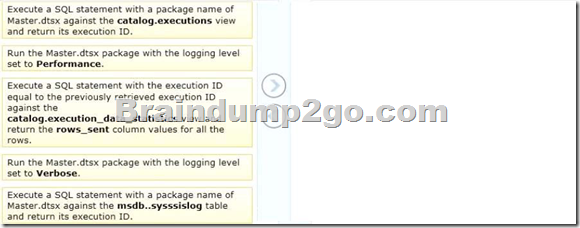
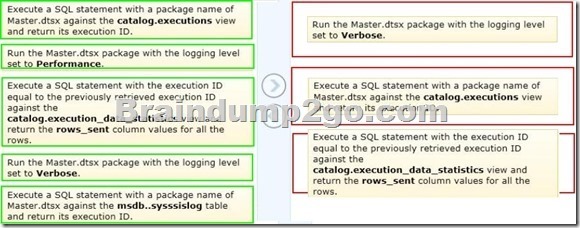
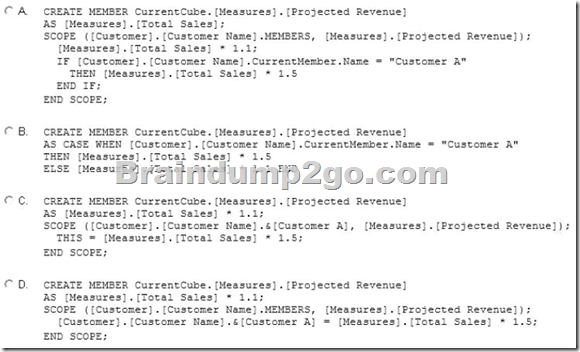


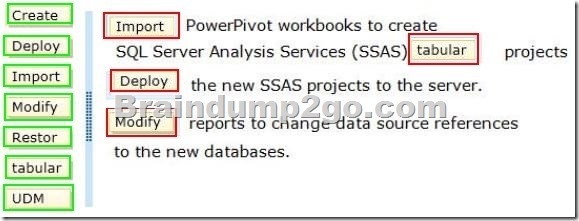
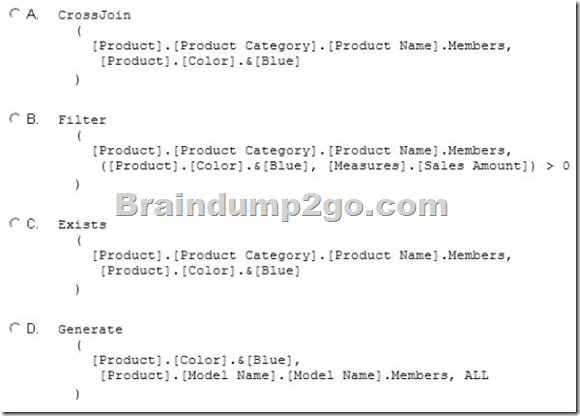
![1[9] 1[9]](http://examgod.com/bdimages/2c8647258228_F2B4/19.png)
Comments are currently closed.